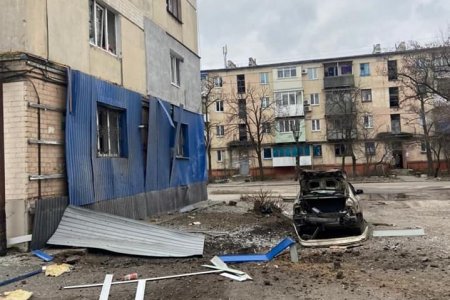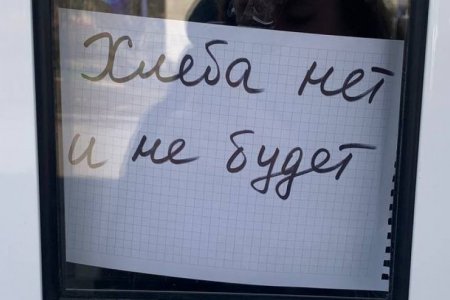
On the second attempt Olena Yakhontova was able to leave Mariupol with her three children. The kindergarten in which she used to work was leveled. Chechens now live in her house and give the flats to everyone who wants them.
— Olena, tell me please, how old you are and where do you stay now?
— I am 39 years old. I have lived in Mariupol for all those 39 years. Currently I am staying in Zaporizhzhia oblast, Avgustynivka village.
— Can you recall, please, what was the first day of the war in Mariupol, February 24th?
— Between 4 and 5 AM, I don’t remember the exact time, we woke up because there were two significant explosions. I was in bed and I was, as they say, lifted in the air along with the bed. So it began. In general, we were used to remote explosions. So it was not unclear what is happening, but later we turned on the TV and there was the report that the war started. That’s it. My ypungest son’s birthday was on February 23. We were celebrating, nothing predicted [the war] at all! We attended the kindergarten on February 23. It was all fine, but we woke up to this news.
— What was your reaction? Were you prepared for this?
— No, I was not prepared at all, and I don’t think one could be prepared for something like this at all. The first thing I did consciously and automatically was to pack all my documents in the separate backpack, everything that we had. I put it near the exit. I was sitting there, waiting, because my husband… I don’t know if I’m allowed to say this — because I am so intimidated already. My husband serves in the Armed Forces of Ukraine. So there’s that.
— Where was your husband then? At the beginning of the war?
— He was in his combat brigade at the time. I was alone with the children. I waited alone with the children as well.
— Did you think to leave at once, since the first day of the hostilities?
— Not at first, but my husband, when we could still phone each other, told us to leave – we have a car. Leave... All our acquaintances and parents thought that it would be several days and it will all be over. No! It was not limited to several days.
— And when your acquaintances told you: “A few days and it will be over,” what did they mean?
— They all thought it was not true — that there will be a few explosions in the outskirts and all will be as always, meaning, nobody believed it was a full-scale war.
— When did you realize that you had to leave the city?
— We tried to leave twice. The first time it was on March 5, it was based on hearsay. When we tried to leave, there were four cars, mine was the fifth one. Then my brother has punctured a tire, and the convoy simply left us and went without us. We could not even understand where they were. We got to the city center and wanted to go towards Zaporizhzhia, but nobody let us through. Everything was loud, everything was exploding. My parents live near the railroad station, not far from the center. We went to them and spent the night with them, back then they had everything: their own house, water. On March 6, around 5 am, when the curfew ended, we dashed home — 54 Morskyi [Sea] Boulevard. And we stayed there, because we realized that we cannot go anywhere, we are not allowed to leave the city as of March 5.
“The civilians were lying there… And almost all of them had either their temple or their head hit. A girl was lying there… I told my oldest son that her face looks familiar. And he said: ‘Mom, it was Veronika, my classmate, she was 15 years old.”
— As I understood, the second attempt was the successful one. When you were able to leave?
— Yes! There was the departure, yes! Since Monday we started asking around, because they told us that the bridges were destroyed and we could not leave. One man from our group, there were 15 cars, he mounted his bike and visited two bridges. And he said that one bridge was destroyed and as for the other one, the cars standing around, some burning and there was oil everywhere, but small vehicles would fit through. We decided to find everyone we could, gathered 15 cars and on Wednesday in the morning, at 6 am, we were all ready. There was this situation: we lived in the house No. 54 and Chechens have already entered No. 60. They were already checking the buildings. That happend on Sunday and on Monday we started to act. On Tuesday I was approached by an unfamiliar man, he touched my shoulder and said “You know, we will report you first”. That’s it, I haven’t seen that person ever since. Who was he, what was he… Now I understand why would they “report me” - my husband is in the military. I panicked. We gathered all that we could and left.
— You haven’t communicated with that man? Haven’t replied anything?
— No! I was shocked after hearing that.
— And what do you think, who was he? I mean, was he a kind of a saboteur? A representative of the Russian army in plain clothes?
— Anything is possible. Perhaps the neighbors told who my husband was, although we almost never told it to anyone. He always arrived and changed his clothes fully, he never entered our house wearing uniform. However, somebody told, the very “well-meaning”neighbors, I believe.
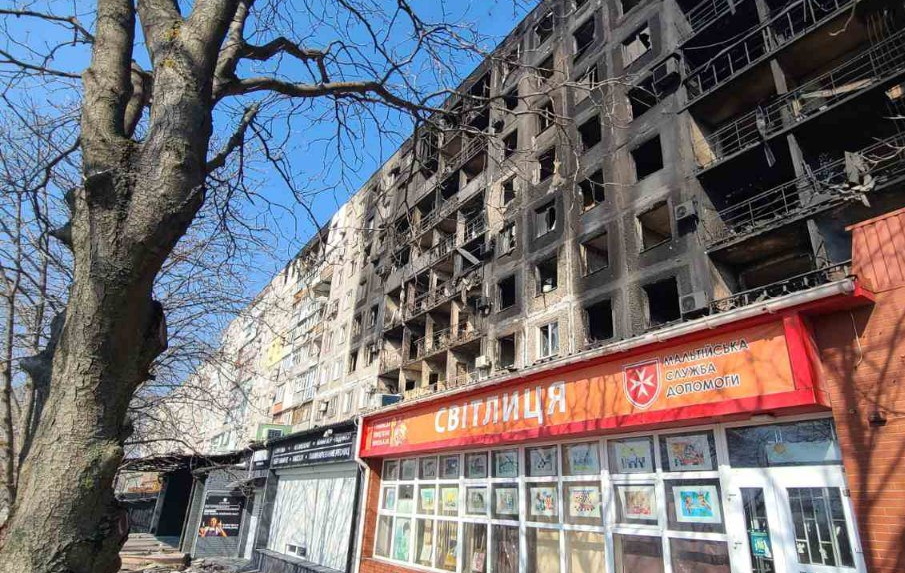
— Tell me please, how did the army treat the civilian population during the time of your stay in military Mariupol?
— Several times I’ve seen the “Azov” fighters ran past our house. Of course, they were well equipped and dressed in a special uniform. In general, I know them because they were located nearby. They were running, training near the sea, I saw them and I could already recognize their appearance and who they were. They were running by towards East and shooting . When I faced them, he (an Azov fighter — ed.) said: “Go, hide, quick.” Well, he said it quickly and ran away. That’s all concerning our guys, Ukrainians. As for those… We were getting water, there was no running water. Our house was on the hill. And we had to descend. And there are our houses and the church finely placed along the boulevard. They’ve got a big well and they allowed people to take water from it. And when we were told that the Chechens entered, the sniper shots have started to sound. One fine morning I and my eldest son, he is 14 years old in 9th grade, we went together and there were bodies lying near the well… The civilians were lying there… Almost everyone had their temple or head hit. I realized that it is a sniper, yes? A girl was lying there… I said to my son that her face looks familiar — I could not understand, I’ve seen her somewhere… We gathered water quickly, because there was non-stop shelling, and quickly went home. When we arrived, he said: “Mom, it was Veronika, my classmate, she was 15 years old”. Meaning, the girl simply went to get water, and never returned home. That span between our house and the water — maybe 100 or 150 meters. We never went to get water after that. One fine morning we heard the volleys. I don’t know what exactly, but first we heard the hymn of Ukraine, and then the volleys, probably five of them in a row. And then the neighbors told us that “Na Zubok” cafe, house 46, was smashed completely — two entrances were leveled — because the people turned the hymn on and put out the flag. And the house was gone…
“In the evening a neighbor looked out from the window on the eighth floor and he was shot in the head.”
My flat is near the sea, my brother used to tell me: “Don’t open the windows and don’t look.” However, I needed to look there. I opened the window and looked out, I was curious and wanted to know if there were ships. I haven’t seen ships back then, but I saw a helicopter flying, and in the ravine, in front of the sea, the private sector and there were three streets. The helicopter flew towards Azovstal to the slag mountain, and accurately hit each house: I could see shells coming out from the helicopter and hitting each house… It flew by to the slag mountain shuting every building. It turned around and did the same to the second street. I didn’t understand, why. There is sea nearby, people don’t even have basements. I’ve seen it with my own eyes. It was the last day when I looked out. In the evening a neighbor from the fifth entrance looked out from the window on the eighth floor and he was shot in the head. We went to the flat to take that woman and somehow bury her, because it was cold at first, but later it got warmer. They brought her down and wanted to bury her. A man, his name was Andriy, and another person who used to work at our Miskvodocanal, he used to always wear the vest “Miskvodocanal.” They went to dig, and there were shots. That man from Miskvodocanal was wounded. And Andriy said that they simply put her down and poured some soil over her. He said: “I won’t go burying people anymore, because I am scared.” And then we simply brought the bodies out, well, not me personally, the men who were going out. Simply put them in one place and covered by a blanket, or a rug, or something else. We realized that it will be warm sooner or later.
Each day, in the morning and in the evening, I went out and thanked, as they say, I don’t know whom, that my car was still intact. My eldest son always told me: “Mom, why are you going there?” I went to check if my car was still intact to be able to leave. There was a good covered parking lot near our house, but it was gone along with the cars. When we were leaving, the people told us that there was shelling, shooting… For example, we went past a tank with this fine letter ‘Z’and the shaft bound with a white band. We realized that they were shooting through the buildings, just regular private houses and residential buildings. And they were so “accurate” that they never hit anything. Meaning, the place where Azov guys were located, they shot the district around it. It was seen a kilometer around how they shot and could not hit them, but I’ve seen how the houses and people were gone.
My car is very low. When you drive you are afraid to be abandoned behind the convoy. And there is a body lying on the road, and you realize, that you should drive around it to avoid it, and the convoy may abandon you if you do. Or you can run over that body, because you have to move along. We drove around them, we tried to. I drove and repeated one thing: “Don’t puncture wheels, don’t puncture wheels, don’t stop.”
— Did you have to run over bodies?
— Yes, I personally ran over a body. Yes. Because my car would not have climbed the curb, like others. I was driving with my dashcam turned on and that recording was saved. When we arrived to Cheryomushki (the former name of the Prymorskyi district of Mariupol — editor), we encountered there several Ukranian servicemen. I have our little flag, and a video recorder in the car. He approached me: “Young lady, please, remove the video recorder,” and that was all. I took the recorder away and thanked him a lot for reminding me, because I drove automatically. Then I hid the little flag and literally 100 meters away there were already other military people [Russians].
— How did Russians treat the civilians who came past their checkpoints leaving the city?
— The first checkpoint that we passed after Cheryomushki, — they simply let us through. One of our cars was broken back then and we had to spread [to other cars] the belongings of those people, we didn’t even notice the first checkpoint. I clearly noticed at a checkpoint in Mangush that they were not treating us like humans. I bought a car with a technical certificate, but the insurance was not issued to my name and he told me that I stole the car and so he will not let me through if I do not present my insurance now. I tried to explain to him, but I realized that I was not being heard. I simply showed him the insurance and said “Do what you want.” I did not feel like talking to them politely anymore. After that they were checking my car for around 20 minutes, they opened the trunk and looked everywhere… “Go.”, - and we went. The same was repeated almost every kilometer. My brother and I counted, there were 16 checkpoints until Zaporizhzhia.
— How dangerous was it to go along that route, not counting the Russian checkpoints. Was there shelling?
— Extremely dangerous. We went along the roads that people passed through before us, not the ones with the asphalt, but the ravines, through reeds, anywhere. There were t “Mines” signs, so it was very scary. We stopped when there was whistling and rumbling. We realized that there were loud explosions somewhere nearby.
— Is there anything else that you remembered during your departure from Mariupol?
— Yes! It came from Mariupol. I was found by the people from there, they called my phone. I understood that the phone calls were made from Ukrainian numbers and they introduced themselves: “Senior Commissioner Shaliyev”. “Who are you? Where are you?” and similar questions. I asked who was calling me and whom he was trying to reach and they promptly disconnected. There were three such calls, only with different names. So, I realize that they looked for the families where the men were in the war. When we approached Tokmak at 4pm, for example, we were stopped by the people who lived there preventing us from driving at night. There were Buryats on the last checkpoint, as they said, and back then we did not know what that meant and who they are. They offered our entire group to spend the night there. Some were let into a kindergarten, some took people in their homes, they also fed us. It was all fine and in the morning we started moving again.
We needed to repair a tire. Two RF soldiers with white bands approached me personally. Why did I remember that? Because one of them was wearing black female Uggs and a female sweater under his coat or jacket. He began telling me something, but I was already like a hedgehog. I didn’t need discussions, just leave me alone! He tolde me once I turn my head : “I don’t understand you.” He repeated it again, but then he suddenly left and another one approached. He said with a strong accent, “We are from North Ossetia.” I cannot even recall it all. My car has tinted windows, - “Remove the tint.” I said: “I am a girl and cannot do anything, if you need something done, take the car and remove the tint.” He looked into the car and said: “Oh, you’ve got three children.” In the convoy there were some cars without the children. “Place your children in other cars so that they would not touch you”. He brought me a tape and I put on the “Children” signs. Then we went, but I heared someone hitting my car and running after us. “Stop!” I lowered my window. I knew I insulted them as much as I could, but he said: “You know, go faster, maybe they won’t hit you.” Maybe it was because the Buryats arrived, he said something else in his language and we went. away
We arrived to the final checkpoint and we saw the tattered men standing there. Those weren’t military peopl, they were shabby! He stood munching a green apple and, you know, when I lowered the window, he spat out. He spoke with heavy accent, he was not Russian: “What do you have there? What do you transport? Who are you?” and similar questions. He looked at the certificates of my children and the documents for the car. “Open the trunk, open the rear doors!” As they say, he comb through the car, but at least he didn’t mention the tint. Our route to Zaporizhzhia took two days.
— Did you speak to Russian military or other formations directly in Mariupol? Maybe, they visited you in the basement?
— They did not come to the basement, but I had a situation of another kind. I was phoned, the caller introduced himself as my parents’ neighbor. They said they had my mom’s bag and documents, that my mom died. They even said the number of our house, I think, 22. It happened in late March — early April. They also said that my father escaped and my mother died and they asked to pay for sending me the documents… I did not give them money and those people disappeared.
— Did your mother really die?
— Yes.
— I sympathize with you and in general, I understand that it is difficult to talk about all these things and about the death of your son's classmate. I have a question: have you tried to explain to yourself, or how can you even explain that snipers are targeting civilians perfectly understanding who they are, especially children?
— First, I could not even take it all in, how is it possible in 21st century, that the peaceful civilians are dying. It was probably some kind of shock at first, but then I got a thought, that they are calibrating their accuracy. They are having fun, but the lives cannot be restored.
— Perhaps in this way they are trying to intimidate civilians or the military, or the entire Ukraine — as people, as a nation, as a country?
— Well, it is true that they are trying to intimidate us. Look, we spent 21 day in the basement, we only communicated within our building. Some said that Ukraine abandoned us, that we would never get to Zaporizhzhia. They said that we were surrounded, people from the house No. 60 said that we could only leave to Novoazovsk through Lyapine (a former name of Vynohradne village in the east of Mariupol, — auth.), we just had to go down the hill.
— You said about the tanks firing at the residential building, similarly, how can it be explained?
— They were standing between our house, No.56, and No.54, and shot towards the plant, towards the stadium (sports complex “Azovstal” — auth.). We saw that. What kind of tanks they were? They were dark green tanks with letter “Z.”
— Was it a kind of chaotic fire and as a result civilian buildings suffered or were there targeted hits on houses?
— I didn’t see the civilians, shells flew and probably,far. There were literally 3 or 4 shells, then tanks turned around and went somewhere quickly. It happend two or three times when they went to the same place to shoot.
— Tell me, what was life in Mariupol like during the war?
— Everybody hid, everyone was scared. People cooked at barbecues, at bonfires. They disassembled the benches to survive, to make a fire. You couldn’t open a tap to gather water, you had to drive to get it, because walking to a well was dangerous. People survived anyway they could. Some went to ruined stores. I had food for children, my youngest son is 4 years old, I shared with my neighbors because they had a seven months old girl. People helped each other as much as they could. We survived like that. Mostly you go to sleep around 7 or 8 pm, and between 3 or 4 am to 8 am there is boom-boom-boom…
The first shell that hit our house, it was on March 2. I was standing near the entrance, and a man who was smoking nearby said “Whistling!” He opened the doors, shoved me through the entrance, he wents up himself and told me “Stay here!” There were two hits — one to a flat on the first floor and the second one near it. Then our light went out. Gas as well. And our life only went (points a finger down)… We could mark the days with chalk. When our flats ignited, we did everything we could, men poured water from the heating system and more or less put the fire out. But the first three floors still burned down. Then our life ended alltogether. Later the men brought a generator, they got it somewhere, a great catch! And then the hunt for gas started, and gradually, once every 2 or 3 days, when it was more or less quiet, we tried to charge our phones. Although there was no connection, we hoped to hear a familiar voice. Such was our life.
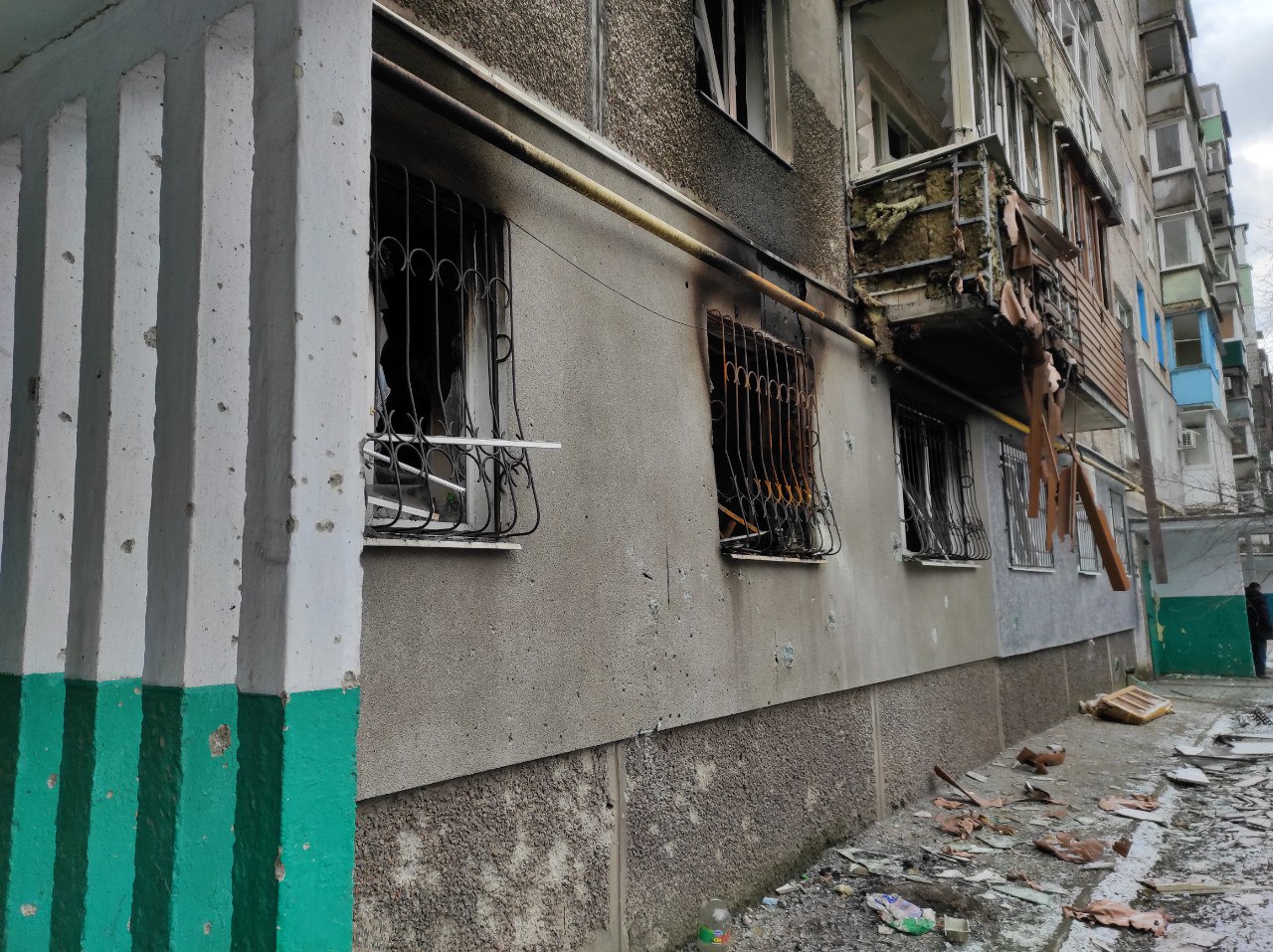
— On March 2, Mariupol also lost all contact, and from what you said, I understand that you had no information about the possibility of leaving the city, so you really tried to collect and disseminate information through hearsay. There is a lot of evidence that the Russians are forcibly deporting or misleading Mariupol residents into the territory of the occupied parts of Donetsk, Luhansk, Crimea, or Russia. Do you know anything about this? Maybe you have relatives who were taken away in this way?
— Look, personally my godfather, Oleksii Tyshchenkp, he is currently in Lithuania. Their nine-story house on 16 Morskyi Blvd. was shelled and destroyed completely. We left in another direction and didn’t know what happened to them. Since his house and car were destroyed completely, they were left empty-handed. At some point between the episodes of shelling they were approached by soldiers wearing white armbands who explained that “you will not pass to that side, you have only one way — to go on foot to Novoazovsk.” An armed person — okay, they went. Back then we only wanted to survive. I was lucky to have a car. We went on the 16th and we didn’t know whether we’ll make it. They got to Novoazovsk, passed some kind of filtering, etc. They called me when they were in Moscow and said that they didn’t know how to leave, because they were not let through. The connection with them disappeared for literally two weeks. Later they called us when they had already entered Latvia. No, Lithuania, I mix up these countries a little.
“We had an old cat, the explosions made his heart pound. One morning it simply did not wake up.”
— And did they tell you how this filtering process went, how they left, how they were treated, what they saw?
— Well, firstly, Russians are very angry with us — that we [Ukranians] arrived and they have to share with us. The refugees were placed in some kind of a barrack. They were told: “For now you will live here.” As for why they delayed escape — they had two dogs, French bulldogs, one was wounded. and they treated it. One fine day people arrived and said they were summoned, I don’t know, maybe tby KGB — something like that. Alledgedly they were called for a conversation. Then my godfather Olexiy said it must be a questioning. That was it, they were asked about Mariupol, where are families of the military, how can one get in touch with them, even on the territory of Ukraine. Now, that shocked me. They took their phones, connected to a cable and checked something. I don’t know anything else. But they had a hard time leaving, Russia did not want to let them through at the border. They said: “We left the Russian checkpoint and simply ran so that other people would take us not be returned.” They left like that.
— Do you maintain any connection with your relatives or friends who remained in Mariupol?
— They said that I need to stand in line to get a Phoenix card. My father, if he is alive, he used to work as the main electrician in the second City Hospital. Maybe, he went there and he is alive, I don’t know, there is no connection. All the lists of people receiving humanitarian aid, where you can see the names, he is not in them. In Viber, Telegram there is a group “Railway station,” I look, my parents’ house is No.47, and No.45, No.43, No.48 — they are gone, Those houses are gone. I don’t think that everything is ruined, my house stands. Unlikely… With those explosions… We had a pet — a hairless cat that lived with us for 15 years, a good old cat. These explosions made his heart pound, and one morning he simply didn’t wake up. Everyone worried and the cat worried. It’s not a human life, but it’s our cat. We went outside, buried him and moved on…
— I think that as a resident of Mariupol, you still remember what happened in the city since 2014. Maybe you can recall something from what you remember?
— In 2014 I lived in another district, in the city center. Back then I had two children and I remember how the police precinct was burned in the city center, there were shootings — because it was literally 150 meters away from the house where I lived. And it was scary, you heared sirens, but we didn’t believe, we had to see it with our own eyes. However, it ended soon. Later we went up to see those buildings… It was scary!
— What did you do before the start of the invasion and what do you plan to do now?
— I have a large family; my youngest son is 4 years old. I was on the official child care leave, I worked in a kindergarten and I still consider myself to be working there. When we left on March 16, I went past my Kindergarten in the center of the city, it is 43 Gretska [Greek] Str. It was gone. There was no building. Destroyed completely. Although my building was pre-revolutionary, there were nurseries, there were children up to a year old. Later there was a health center. It is all gone too. So, that building survived the war, but did not survive the “peace”, who knows which one is which. And as for my plans… Maybe, survival. I’m gonna wait for my husband because it is scary… I am thankful to my friends who provided the shelter. Meaning, in 21st century, being 40 years old, we are homeless. I cannot even choose another polite word. We are hobos. We were accepted in the village, I did not expect that people could be so kind, understanding and helpful. Like that. We were registered with school, because my eldest son is the in ninth grade, I understand that he needs to have something. We are completing our paperwork, we have written an application, we have received a certificate of temporarily displaced persons. But when something rumbles somewhere, even if someone drops a bucket — my youngest child runs to me, he is shocked, cowering: “Mom, I’m scared.” We will be afraid of the consequences for more than a year. Good thing it is summer now, but I don’t know what happens next. I believe in victory but I don’t know… My flat, my house… What’s next… It is scary.
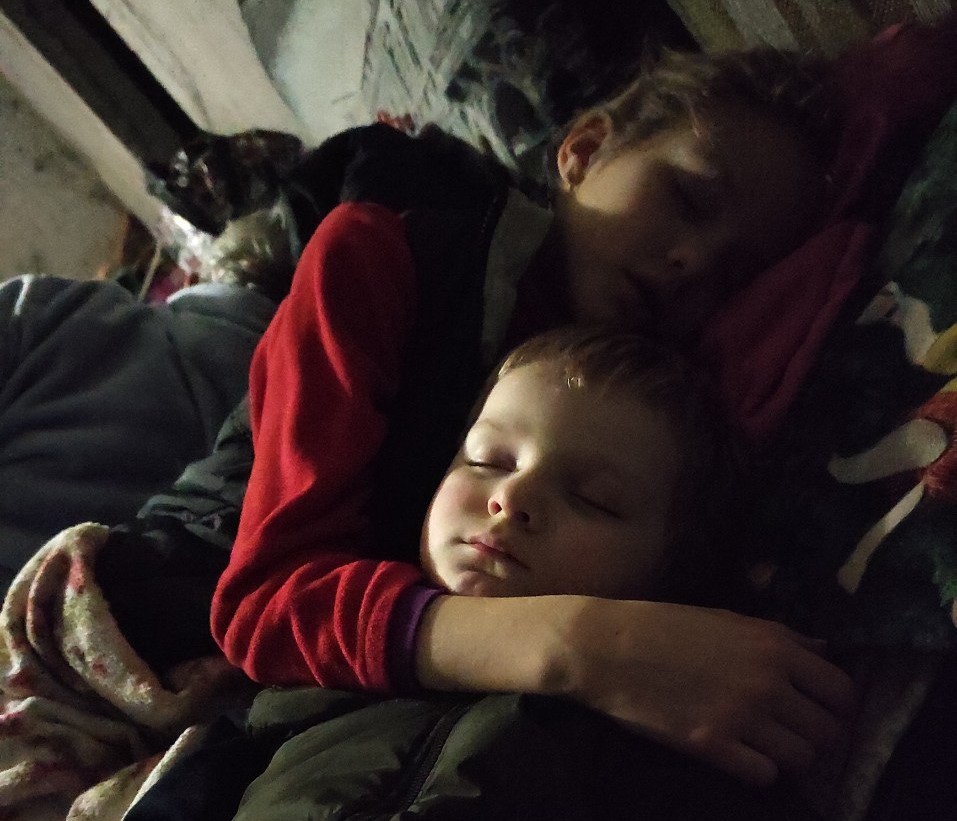
— Do you know what happened to your building, is it still intact?
— Yes! The windows are shattered in one room and something else is shattered. Chechens are now in our entrance and they give flats to people who don’t have flats. Enter and live… They live on the first floors. And in our kindergarten, across from our entrance, literally 50 meters away — they have central headquarters there. But the fact that they give away flats, it was texted to me by a neighbor, with a video, he arrived to see our flat, he was in another district. He was able to charge his phone somewhere and recorded it. There we go now… He said he would want to go to his flat, but he was told: “Look and go away, we live there now.” That’s it. We don’t have anything.
— What do you feel towards the Russians now?
— I can only say one thing. Since the beginning of the war — I have cousins, an aunt here — nobody phoned, nobody asked how my family is faring, how we are. I only feel hatred towards them and I curse them all. Because after I’ve seen a 15-year old girl who hasn’t really seen life, lying there with her head shot… It isn’t normal when children die. The day I left, literally on March 20 or 21, my sister wrote to me in Instagram that she is ashamed. But she couldn’t help me. I posted in my stories that all my relatives from Russia may follow the Russian warship. I don’t have any relatives there anymore.

